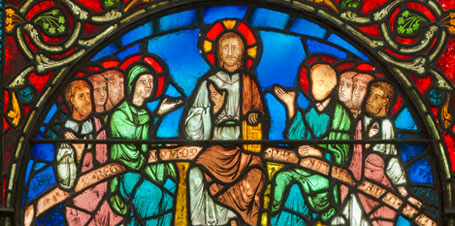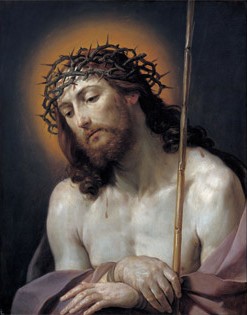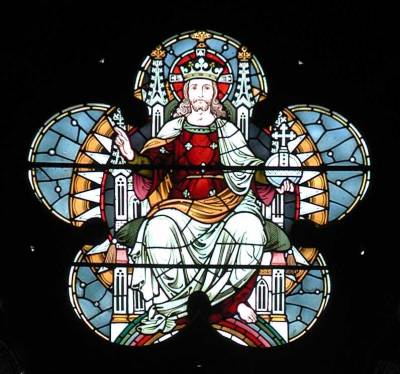I taught ancient Greek and Roman History. My students loved the stories of Marathon and even
Thermopylae. The great exploits of the armies of Sparta and Athens inspired generations of students before my classes read about the battles which made Europe Europe.
Same with the history of the battles of Vienna and Lepanto. Same with the Battle of the Bulge.
Tyrants who hated liberty and tyrants who hated God lay in the dust because of brave men, like my dad, still alive at 92, and a World War II veteran.
The above article reveals a perspective not new to me. I remember asking my class of mostly young men in 2003 in Alaska if they would fight another war to save the Church and the West. The answer was a resounding "No"! I knew my students, all Catholic, and I knew what their answer would be, but I was still disappointed.
Boys who do not learn to sacrifice do not become men.
Patriotism is a minor virtue. It springs from the virtue of duty towards one's parents, a command of God to honor one's parents,and by extension, one's home land.
Patriotism includes a love of place, of a people with whom one can identify. The great heresies of individualism, an American blight, and relativism, both parts of the heresy of Modernism, has ruined the hearts of so many Americans and Catholics. The lack of patriotism is a lack of identity with the common good.
Some love countries other than, or in addition to the land of their births. I am like that type of person. loving the country which gave me my son, and moving there years before I was married and had a child because of a deep identity with this certain country.
One cannot always explain a "spiritual home" but for me, the Faith which built Europe, was still more obvious in Great Britain, than in Protestant America, despite years of oppression, when I move there so many, many years ago.
What causes love of a country is this identity, and for me, the identity of Catholicism. Having read history in college, as well as theology and philosophy, I knew the great heritage of thought and practice which made Europe unique, totally believing even as a young person, like Belloc, that Europe was the Faith and the Faith was Europe. I loved the heritage of art, architecture, music, education, even food, which was the heritage of Christian Europe.
I read every book (and still have every book) on this subject that Christopher Dawson ever wrote as early as the late 1970s. Because I knew history, I could sense the signs of the times. Because I knew my religion, I understood what was happening on the European front of the war, as well as on the American front.
I read every book (and still have every book) on this subject that Christopher Dawson ever wrote as early as the late 1970s. Because I knew history, I could sense the signs of the times. Because I knew my religion, I understood what was happening on the European front of the war, as well as on the American front.
The Catholic Church has lost great influence in the European world, just as Protestantism morphed into secularism in America. We know witness the rise of pagan nations, and paganism is rooted in selfishness, self-love and not love of a people or nation.
This passing of patriotism must be mourned by those of us who understand what this death of the heart means. Charity towards neighbor dies in a land of those who do not love their country. Civilization dies once individual desires take the place of sacrifice for the common good.
Men like my dad who spent their youth in trenches fighting against the real tyranny of Nazism perhaps no longer exist in the numbers needed to preserve freedom. And, when a nation turns its back on God, to be honest, freedom no longer exists to preserve.
God will let nations die for lack of love, love of patria, love of neighbor, love of Him. He will punish nations which turn to lust, greed, gluttony, pride and so on. He will let people go their own way until there is no other way to turn but to Him.
This movement of punishment, death and rebirth forms a persistent theme in the Old Testament, when God called His People to repentance over and over through the words and deeds of the Prophets, who frequently, where killed rather than heeded.
Christ Himself prophesied the Fall of Jerusalem and He wept, one of the few times mentioned of His weeping.
O Jerusalem, Jerusalem, killing the prophets and stoning those who are sent to you! How often would I have gathered your children together as a hen gathers her brood under her wings, and you would not! Luke 13:34
Satan has successfully spent years emasculating the men of my and following generations. Leadership simply cannot be found, either in the Church or in the State. We face the death of nations for one simple reason. Without Christianity, without God being the center of one's life, men stay as children, lost in the never, never land of self , pleasure, sloth.
How many times I have written about the "peter pans". The Lost Boys were lost not only physically but mentally, psychologically, spiritually. But, even they fought in the story, pushed to rescue and defend their own little world.
We have no defense, no cohesive energy to withstand whatever enemies decide to come against us. Women who are Christian have seen this for two, if not three, generations, lamenting the lack of protectors and the overwhelming presence of predators among the males with whom they come into contact at work, college, or even in church.
We await the canonization of the first couple to be canonized together, Louis and Zelie Martin. Louis was a quiet, monklike man who God called to raise a house of saints. His type, the sacrificial man, is so rare that the day of his canonization, along with that of his brave and loving wife, will be a tribute to a truly lost generation.
Catholics forget that God commanded the take-over of the Promised Land. Abraham fought, Moses fought, Joshua fought, Gideon fought. David fought--all saints, all men of God.
No Charles Martel, no Charlemagne, no Men of the West, no Louis Martin walks the streets of Athens today, or Chicago, or Canberra. The heart needs God, needs Christ to be a patriot.
All the pagan cities fell to the energies of the new generations of those focused on Christ and His Kingdom. Christendom died a long time ago, but now, even the vestiges of civilization crumble from the lack of will and, more importantly, the lack of virtue.
War began in Heaven. It was an extremely short war, but the battles continue on Earth. St. Michael, one of the lower echelons of the heavenly host, won the day. However, the mop-up falls to us.
Thirteen years ago, when I was facing death, I told my young son that I wanted a certain phrase on my tombstone. This phrase was one I had pondered for many, many years before this occurrence.
Now, we do not even have heroes of fiction.
“I wish it need not have happened in my time," said Frodo.
"So do I," said Gandalf, "and so do all who live to see such times. But that is not for them to decide.
All we have to decide is what to do with the time that is given us.”
J.R.R. Tolkien, The Fellowship of the Ring
I decided to become a saint, and to raise a saint. That is what Louis and Zelie Martin decided to do.
That is the call of every Catholic parent. Some saints may become leaders, even leaders of war.
Pray that God puts a heart of warriors into some of the sons born to real Catholics today. The great spiritual war is not over, yet.
I have given God a spiritual warrior. May other parents give their sons to God, both for prayer and penance, and even for war.
St. David, pray for us. St. Martin, pray for us. Saint Joan of Arc, pray for us. St. George, pray for us.
(P.S. Did you read the encyclical in the previous post on the Church Militant in my repost?)
(P.S. Did you read the encyclical in the previous post on the Church Militant in my repost?)













